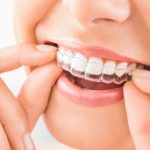What Your Teeth Say About Your Health
Poor oral health is a pretty big problem on its own, as complications such as infected tooth nerves and diseased gums can be quite painful. Poor oral health can also be an indicator of something wrong in another part of your body. The following dental problems are often signs of a larger health condition:
Cracked Teeth
Enamel gets weaker over time. You use your teeth a lot, and enamel doesn’t grow back. So there’s naturally going to be some wear and tear. But if your enamel is wearing down so much that your teeth are cracking, that’s more than the usual wear and tear. Enamel shouldn’t be that weak.
Weak enamel and cracked teeth are a symptom of gastroesophageal reflux disease (also known as GERD or acid reflux). GERD involves stomach acid traveling up the esophagus, and this acid can spill over into your mouth and damage your teeth.
Teeth Worn Flat
Teeth that have been worn flat over time indicate that you have a grinding problem. You might be aware of this already if you habitually grind your teeth during the day, but a lot of people grind their teeth at night while they’re sleeping, so they don’t even know they grind.
Whether you do it while you’re awake or while you’re asleep, grinding (and therefore, flat teeth) is usually a result of stress (both physical and mental)
Stubborn Sores
It’s normal to get a sore in your mouth every now and then. Teeth are hard and sharp, and as you move your mouth to talk and eat throughout the day, there’s always a chance you’ll accidentally bite yourself and leave a sore.
What’s not normal is to have a sore that never seems to go away. This might mean that you have oral cancer. If you realize one day that a sore in your mouth is seemingly invincible, you should schedule an appointment with a dentist for a cancer screening right away.
White Webbing
If you’re ever brushing your teeth or flossing or doing anything else that involves looking into your mouth and you notice some lacy white material in your cheeks, then you just might have lichen planus.
Lichen planus is a skin disease that affects 0.1% of men and 0.3% of women. The cause of lichen planus is not known, and there is no known cure, but thankfully, the symptoms are mild in most cases.
Crusty Dentures
Even your fake teeth can have something to say about your overall health.
Leaving dentures overnight puts the elderly at risk of developing aspiration pneumonia, a leading cause of death among seniors (this is one reason why dental implants are generally seen as a better way to replace missing teeth than dentures).
When dentures aren’t cleaned properly, they can carry dangerous debris to a person’s mouth, which can then be sucked up into the lungs and cause severe, life-threatening inflammation while the individual sleeps.
Dentures should never be crusty when you put them in your mouth – make sure you use an effective cleaning solution and clean them thoroughly.


